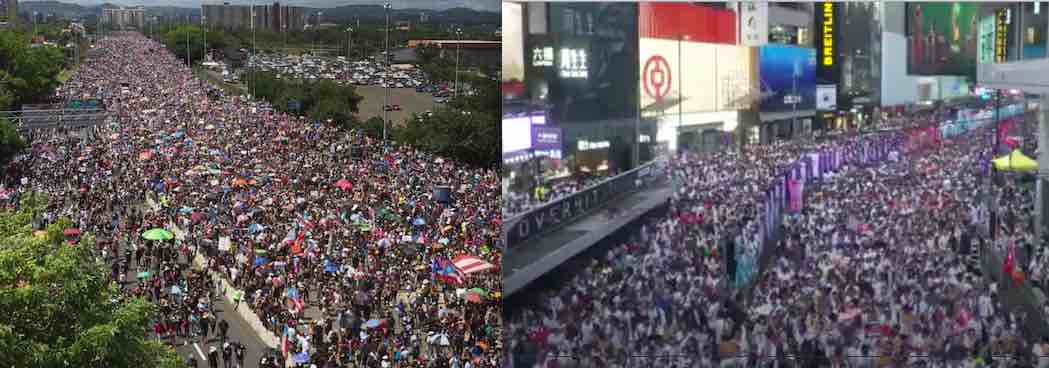By Dave Lindorff

Two images of massive demonstrations speak volumes about the striking similarity between Hong Kong and Puerto Rico, one an island and peninsular former colony of Britain, now returned to China, but still existing in a kind of neo-colonial relationship to that country, the other an island colony of the United States ever since the US conquered it and its people from Spain as a spoil of war in the 1989 Spanish-American War. Both places contain hundreds of thousands, even millions of angry citizens demanding freedom and a right to control their own destiny.
The two images, showing hundreds of thousands of protesters in the street demanding the resignation of their respective leaders, Chief Executive Connie Lam Jehng Yuet-ngòh in Hong Kong and Governor Ricardo Antonio RossellóNevares in Puerto Rico, are equally astonishing displays of raw citizen activism by people in the position of colonial subjects fed up with the corruption and subservience of their compromised puppet leaders, and with the governments that are controlling them in Beijing and Washington, DC.
Hong Kong, for two centuries or more a colony of Britain — one in which for most of that time racist British officials lorded it over Chinese people who were often banned from government positions, restaurants and elevators, humiliated and prevented from gaining residence in the “mother country” — is now a kind of “colony” of China. The territory, now euphemistically called a Special Administrative Region of China, technically has local autonomy and a legal system based on British Common law, but it is wholly subordinated to the government of China in Beijing, with its laws subject ultimately to Chinese law, particularly when it comes to national security issues. Puerto Rico, a Spanish colony dating almost back to the arrival of Christopher Columbus until the end of the Spanish-American War of 1898, later became a spoil of war and a colony of the US. The relationship of the island to the US remains a colonial one, though the name in 1952 was euphemistically changed to “Commonwealth” of Puerto Rico, or in Spanish the Estado Libre Asociado de Puerto Rico.
In Hong Kong, local citizens elect half the members of their Legislative Council (Legco), with the other half chosen by so-called “functional constituencies” — basically various professions from lawyers to bankers to industrialists and labor. The successor to the British colonial governor is now the Chief Executive. Where the governors were appointed by the British government, the new top position in Hong Kong is filled by Beijing, which hand-picks a selection panel of some 1000 people for the purpose. In Puerto Rico, the people on the island get to elect their legislature and their governor, but they have no elected representation in the US Congress.
For the rest of this article by DAVE LINDORFF in ThisCantBehappening!, the uncompromised, collectively run, seven-time Project Censored Award-winning online alternative news site please go to: https://thiscantbehappening.net/two-colonies-doomed-to-2nd-class-status-and-remote-central-government-control/

